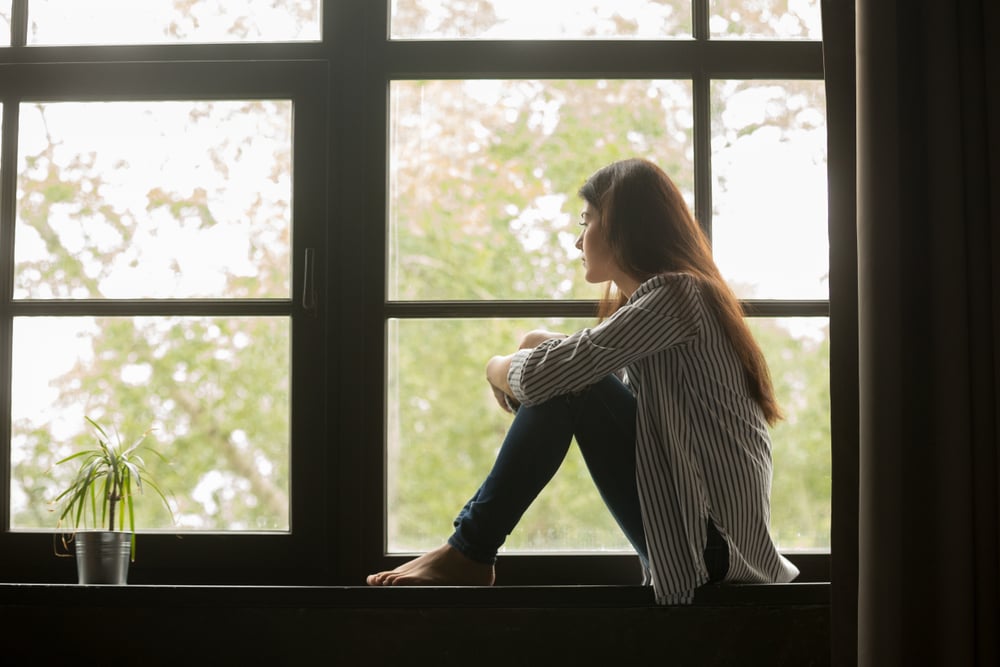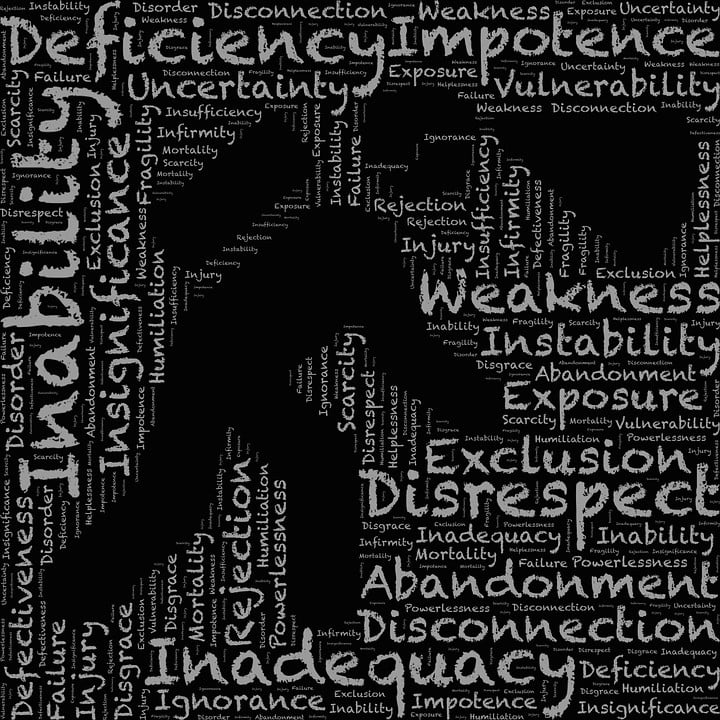
.........................................................................................................................................
Sadness For
No Reason
 |
Insecurity often leads to hardship when it is time to let go
and can induce extreme levels of self-doubt. |
Why Do We Sometimes Feel Sad For No
Reason?
Safa Khan
“Life doesn’t stop at a single situation or for a single
person. Life is about moving on.”
Do you ever want to sit down and cry for hours for no reason at all?
Do you feel blue or broken, as though you have no interest in doing
anything?
This is a situation when you feel sad for either no particular reason
or many reasons!
The bottom line is sadness is addictive.
And you need to save yourself from this addiction!
We often feel sad, but do nothing about it, since we think
that we deserve bad things and indulge ourselves in thinking about things we
cannot change.
Does this sadness have a term for it?
No.
To date, there is no widely accepted word to describe
the feeling of “sadness for no reason”, although it’s experienced by countless
people, regardless of their age group or gender.
However, there is a term that can sum up this sadness
in a word: Hypophrenia, which is defined as a “vague feeling
of sadness without any cause.”
The problem is that the scientific-medical definition
of Hypophrenia roughly means “mentally retarded,” which
has a negative cultural connotation that isn’t directly related to the symptoms
being described here.
So, just as there is no defined reason for this sadness,
there’s no fixed term for this sadness either!
If we feel sad for no reason, can there still be a reason
behind it?
We often don’t realise that we carry the burden of
countless past experiences in our subconscious, many of which can be triggered
at any point, causing us to feel sad.
Our brains store a ton of information and memory, so
we can’t possibly know when some auditory or visual stimulation will
trigger that neuronal nostalgia.
At the point of a triggering moment, we aren’t aware of
what memory our body is remembering, but we feel the heaviness of sadness in
us.
The grief can be so powerful that it may easily distract
you from the activity you’re doing; it might make you overthink, become sad and
lazy, or even break down and cry.
Not knowing where this sadness is coming from can be
extremely exhausting.
What are the types of experiences that can
trigger this sadness?
There can be many types of experiences that are
subjective to everyone. People often connect their sadness to other people and
try to find their happiness in others.
They become so dependent on another individual that they
forget they have a life of their own! This dependence is a common cause of
disappointment and pain.
Trust takes years to build, but only seconds to
break. When your trust is broken by someone very close to you or someone you’re
in a relationship with, it becomes difficult for you to trust anyone else after
that.
You develop “trust issues”, which stop you from
believing what people say.
Having trust issues is not a small problem that you
can keep within yourself. You need to maintain a balance of trusting people, as
well as knowing who to trust.
We may also develop a feeling of sincere regret. We
regret trusting the person and wish that we could have known their intentions
from the very beginning.
Wouldn’t it be nice to watch a trailer of someone’s
purpose in our lives before getting to know them? Our life would be so much
simpler that way!
Regrets are carried within us for things that we have
done, as well as the harm that others have caused us.
We may even get to the point of feeling that we deserve
this sadness, as though we’re only worth the sorrow, but nothing else. You tend
to lead yourself into loneliness, alienation and isolation.
At this stage, you might want to stay away from people, abandon
social media, and choose to stay in bed at home for days! When you feel
that there’s no point in getting close to others since they will only
leave.
There’s a feeling of emptiness in you that won’t go
away, no matter how hard you try. Whether you’re with people or not, you still
feel alone, self-absorbed and insulated from commitments.
You may feel as if no one makes you a priority, no one
needs you, and even if they do, they will only leave you eventually. It’s not
reality talking to you, but your head!
If you’re sensitive and take everything to your heart, you
may always worry and overthink what others tell you, think
about you or say about you!
Do you believe that, since everyone has someone better in
their lives, they don’t need you? DON’T FALL FOR IT.
If you’re an empathetic person, you’re more likely
to feel sad, since you so often put yourself in other people’s shoes. You think
about your pain, and what others are going through.
When you are so invested in helping others, you often mask
your feelings and stop considering your mental health.
You may feel this sadness and keep it all to yourself,
without letting it out to anyone, because your overthinking brain kicks in and
tells you that “you will bother/annoy them with your problems.”
Other reasons that cause such sadness in you include
traumatic experiences, many of which start in childhood but may keep triggering
you.
An unlikely past event can also make you sad, such as
abusive relations, loss of someone very close to you; this can make you feel
depressed for a long time.
The grief, the memories you carry within
yourself, can be triggered at any time. Sadness is also felt when you
carry guilt in your heart about something.
When you know that you have done something terrible, and
can’t go back to change what has happened, there is a certain sadness that
makes you feel angry at yourself? It makes you blame yourself for every painful
aspect of your life.
Sadness also depends on perception. A breakup
might affect someone so much that they might want to take their own life,
whereas someone else might cope with it and move on.
Perception refers to how much you let the situation affect
you, whether the case dominates your emotions or if you control the situation
and feelings.
Social factors like your parents, peers and even broader
society put various restrictions on you, which can make you feel sad and
controlled by other forces. Authority and forceful restrictions do affect
mental health.
Sadness is also affected by the people you surround
yourself with. When you’re with toxic and pessimistic people, they will spread
their negativity to you. You need to stay away from such people!
How do Gender and Age affect sadness?
Sadness can also be caused by various hormonal changes,
especially in females, when they go through their menstrual cycle or menopause.
This causes changes in their mood, often making them feel
sad. When this gets more serious, it leads to PMS Depression.
Men often feel sadness, but many believe that they
need to embody “manhood” and therefore can’t cry in front of people.
This is why they mask their emotions and keep it all to
themselves, which opens them up to be triggered later. Low dopamine and
serotonin levels will similarly cause us to feel sad.
Age is yet another factor behind sadness; for example,
in adolescence and old age, depression is more visible and unpredictable.
People in their late adulthood often need high levels
of support, care and company, just like an infant. That’s when sadness can kick
in due to the lack of support and necessary care.
The side effects of certain medicines or drugs, alcohol
consumption, or tranquillisers can just as readily influence sadness.
Conclusion
After identifying the various reasons behind sadness,
we can conclude that despite the moments that we feel sad for no reason,
there is typically a memory or experience that triggers us, leading to the
state of sadness.
The way to cope with this is to talk to a professional or
seek catharsis — the discharge of emotional
tension and releasing what is bottled up inside.
“Working through” is another process where you can
talk about your issue to someone else. They can then repeat and elaborate on
what you’ve said to achieve a better state of mental health. Knowing who
you can trust and who you should avoid is gravely important.
Don’t let your insecurities and penchant for overthinking
control you. Try to forget or distract yourself if you find yourself
overthinking about the past. It is in the past for a reason, and cannot be
changed.
What can be changed is the future, which will depend on how
you lead your life. Try your best to be positive and surround yourself with
people who are right for your mental health.
The essential step to happiness is to learn and accept
yourself the way you are. Life is a test and a challenge, and you will inevitably
face loss and rejection. No one is promised a smooth ride through existence.
However, never forget, “Life doesn’t stop at a
single situation or for a single person. Life is about moving on.”
Safa is an undergraduate from St. Xavier’s College, India, pursuing a
Bachelor of Arts (Psychology) degree. She likes to sing, dance and play the
harmonium and guitar. She has performed in events at various international
locations. She likes to read about human psychology and aspires to become a
psychologist.
 |
Once you’re used to being sad, it seems that sorrow pulls you in even deeper.
|
 |
A cocktail of psychological dilemmas
burden the mind and body equally |
 |
Is there a reason behind such sadness?
|

No comments:
Post a Comment